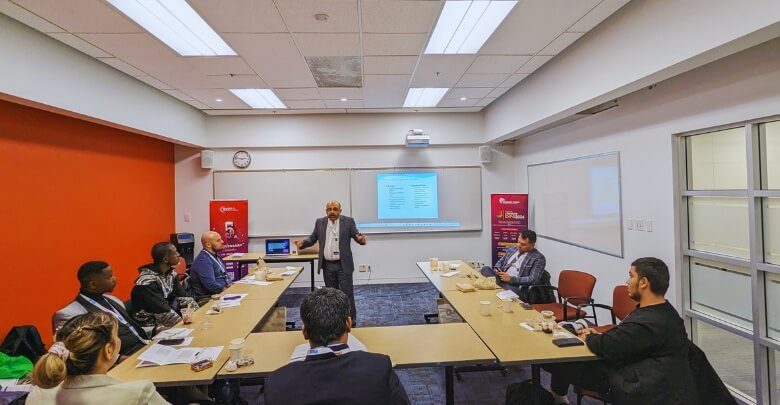Facing an upcoming conference can be difficult. There’s so much to consider, from scheduling to coordinating attendees, and ensuring all the necessary resources are in place. The success of the event depends on detailed planning. If you’re feeling the pressure of putting everything together, you might find yourself asking about the essential steps in a conference preparation checklist.
To ensure your conference runs smoothly, it’s crucial to follow a structured plan. Start by defining clear objectives and goals, setting a realistic budget, and choosing the right venue. From there, you’ll need to plan the agenda, coordinate technical needs, and arrange for speakers. Each of these steps plays a vital role in creating a successful event.
Are you curious about how to organize a conference effectively? This article covers everything you need to know. Continue reading to discover all the necessary details that will help you plan a smooth, impactful conference.
Conference Preparation – Quick Overview
A successful conference starts with thorough preparation. The first phase involves defining clear objectives, setting a budget, and selecting a suitable venue. These foundational steps ensure that the event aligns with its goals and provides value to attendees.
It is important to focus on content development, speaker coordination, and marketing efforts as the planning process progresses. This includes creating an engaging agenda, reaching out to potential speakers, and promoting the event to your target audience. Properly executed, these steps will draw interest and boost attendance.
Creating a checklist for organizing a conference can be incredibly useful during the preparation process. This checklist ensures that no detail is left out, from logistics to attendee communication. By following a detailed guide, you can simplify the planning process and increase the chances of a successful and well-organized event.
Why is Conference Preparation a Necessity?
Preparation plays a significant role in the success of a conference and the experience of its attendees. Bringing all the necessary elements together and executing them properly is the key to proper planning. Below are the key aspects that highlight the importance of thorough preparation for conference planning:
- First impressions count: A well-organized conference showcases professionalism and dedication, leaving a positive impression on attendees and building trust.
- Clear communication: Information is effectively communicated to participants through careful planning, reducing the likelihood of misunderstandings.
- Efficient resource use: Proper preparation allows for the best use of resources, helping to avoid unnecessary expenses and waste.
- Smooth execution: Identifying potential issues and having backup plans in place ensures the event proceeds smoothly, without unnecessary disruptions.
- Improved participation: When attendees are aware and comfortable, they are more likely to engage actively, benefiting everyone involved.
- Post-event advantages: A structured follow-up process, rooted in thorough preparation, can gather valuable feedback, helping to improve future events.
A well-prepared conference preparation not only enhances the current event but also lays the foundation for continued success in future projects.
Conference Preparation Checklist – Essential Steps
A successful conference requires a structured plan, which covers all essential aspects. It is important to have a well-organized process in place to ensure that your desired outcomes are achieved and that everyone involved has a positive experience during the process.
Step-1. Define Objectives and Goals
Before diving into logistics, clearly outline your conference objectives. Whether it’s networking, education, or sales, having defined goals will guide your planning and ensure all aspects of the event align with your desired outcomes.
Step-2. Budget Estimation
A well-defined budget is crucial for managing conference expenses. Allocate funds to key areas like the venue, speakers, and refreshments, while also putting up a backup fund for unforeseen costs. This ensures financial stability throughout the planning process.
Step-3. Select the Venue
Choose a venue that comfortably accommodates your attendees while ensuring a smooth and enjoyable experience for everyone. For example if you are planning a conference in Canada, consider factors like location, accessibility, and available facilities to create a seamless event. The venue should match the event’s theme, offer modern amenities, and provide a welcoming environment that enhances engagement.
Step-4. Plan the Agenda
Prepare a detailed timeline for the conference. Include key events like keynote speeches, panel discussions, and breaks. Ensure time allocations are realistic, providing a balanced mix of content and networking opportunities during the day.
Step-5. Send Out Invitations
Be sure to send invitations that contain all of the necessary information. Choose the best communication method to reach your target audience. Timely invitations help secure early registrations and allow attendees to plan their participation effectively.
Step-6. Coordinate Technical Needs
Ensure the venue is equipped with necessary audio-visual tools and reliable Wi-Fi. Coordinate with technical support to handle presentations and streaming. Properly managing technical aspects ensures a smooth and professional conference experience.
Step-7. Organize Refreshments
Select food services that match your event’s theme and meet dietary requirements. Ensure there are enough refreshments and meals to keep attendees satisfied. The right refreshment arrangements contribute significantly to attendee satisfaction and overall conference success.
Step-8. Arrange for Guest Speakers
Engage keynote speakers early, confirming their availability and understanding their technical needs. Provide event details to ensure they are well-prepared. Reputable speakers increase the conference’s value, offering knowledge that connects with attendees.
Step-9. Prepare Conference Materials
Organize conference materials in advance, including brochures, digital presentations, and promotional items. These materials should align with the conference’s objectives and theme, offering valuable information that enhances the attendee experience and reinforces key messages.
Step-10. Set Up Feedback Mechanisms
Make use of feedback tools like digital surveys or physical forms to gather attendee insights. Understanding participants’ experiences is crucial for refining future events. Feedback helps identify successes and areas for improvement, guiding continuous conference enhancement.
Step-11. Post-Conference Follow-Up
After the event, follow up with attendees by sharing highlights, recordings, or materials. Encourage feedback to improve future events. This post-conference engagement reinforces relationships and contributes to conference success.

What Are the Risks of Hosting an Unprepared Conference?
An unprepared conference can lead to unforeseen challenges and missed opportunities. Here are the risks of not planning effectively.
- Wasted Resources: Without proper planning, resources like time, money, and human resources can be misused, leading to unnecessary costs and wastage.
- Poor Participation: Attendees might lose interest or not participate fully if they face an unorganized event, impacting the conference’s goals.
- Negative Reputation: An inefficient conference reflects poorly on organizers, potentially damaging trust and deterring future participation or sponsorship.
- Missed Opportunities: Without preparation, essential elements like networking sessions or informative panels might be missed, thus reducing the event’s potential.
- Inefficient Communication: Poor organization can result in clearer messaging, causing confusion and misunderstandings among attendees.
- Increased Stress: Organizers and attendees both can experience high stress due to last-minute issues and poor management.
- Lack of Feedback: Without planned feedback mechanisms, opportunities to learn and improve for future events might be lost.
Proper planning is essential to avoid the risks of hosting an unprepared conference. Attention to detail and thorough preparation help ensure a successful event that meets its objectives and leaves a positive impression on attendees.
Tips to Avoid Any Mishaps While Preparing a Conference
Planning a conference is tricky, but careful strategizing can circumvent potential pitfalls. Here are some tips to ensure a smooth event.
Begin Early:
Starting preparations well in advance provides a buffer for unforeseen challenges. It grants time for modifications, ensuring each aspect is perfected. Addressing details early also reduces last-minute stress. This foresight can be the difference between well-orchestrated and rushed events.
Establish Clear Communication:
Effective communication among team members is pivotal. This prevents misunderstandings and ensures everyone is aligned with the event’s vision. Furthermore, maintain transparent contact with attendees. Providing them with all the necessary information ensures their seamless participation.
Regularly Review the Checklist:
A dynamic checklist is a savior. Regularly reviewing it ensures tasks are noticed and milestones are achieved on time. Updating the list with completed tasks gives a clear overview. This continuous assessment helps in timely interventions if required.
Double-Check Technical Aspects:
Technical glitches can disrupt a conference. Ensure all equipment is in working condition and have backup options available; schedule rehearsals. Testing everything, from microphones to projectors, can preempt any potential technical issues.
Consider External Factors:
Weather, local events, or transportation strikes can affect attendance. Keep an eye on external factors and prepare contingency plans. Having backup dates or virtual participation options can ensure that your event remains a success despite unforeseen external challenges.
Gather Feedback During Planning:
Engaging with a small group for feedback during the planning stage can be insightful. Their perspective might reveal overlooked aspects. These early evaluations can also gauge attendee expectations. Adjustments can then be made to meet or even surpass those expectations.
FAQs: Conference Preparation Checklist
When planning a conference, many details need attention to ensure a smooth and successful event. Below are some frequently asked questions that address additional aspects of conference preparation to help you stay organized and prepared.
How Can You Ensure Effective Communication Among Conference Organizers?
For a conference to be successful, organizers must communicate effectively. Establish clear channels, such as regular meetings, shared digital tools, and group messaging platforms. Keeping everyone informed and aligned with the event’s goals helps prevent misunderstandings and ensures smooth operations.
What Are the Best Practices for Selecting Conference Dates?
The right conference date depends on a variety of factors, such as holidays, local events, and industry schedules. Avoiding conflicts with other major events can maximize attendance. Additionally, checking the availability of key speakers and venues is essential for finalizing the date.
How Do You Manage Last-Minute Changes in Conference Planning?
It takes a well-prepared team to manage last-minute changes. Keep a backup plan for unexpected situations like speaker cancellations or technical issues. Regular communication with all stakeholders ensures that any adjustments are smoothly applied without disrupting the event.
What Are the Key Elements to Include in a Conference Registration Process?
A well-organized registration process includes clear instructions, user-friendly forms, and secure payment options. Offering early bird pricing or group discounts can encourage prompt sign-ups. Additionally, providing attendees with confirmation details and event information enhances their overall experience.
How Do You Handle Transportation and Accommodation for Attendees?
Travel partnerships and hotel rates must be arranged to coordinate transportation and hotels. Providing clear information on how to reach the venue and offering hotel options close to the event location can simplify the logistics for participants, contributing to a positive experience.
Final Word
A successful conference is the result of careful planning and attention to detail. By following a structured approach, from defining clear objectives to post-event follow-up, you can ensure every aspect of the event is well-managed. Utilizing a conference preparation checklist helps keep everything on track, ensuring that nothing is missed and that your conference meets its goals effectively.
Be sure to start early, communicate clearly, and review your checklist regularly as you prepare. Double-check technical needs and consider external factors that could impact your event. With these tips in mind, you’re well on your way to hosting a successful conference. Best wishes as you begin this exciting new chapter!







